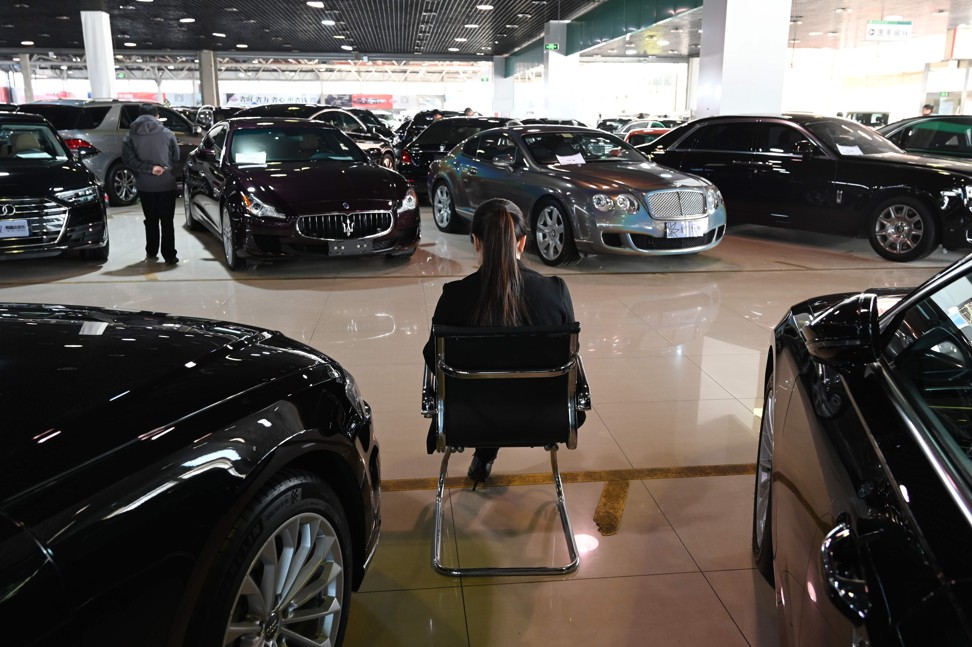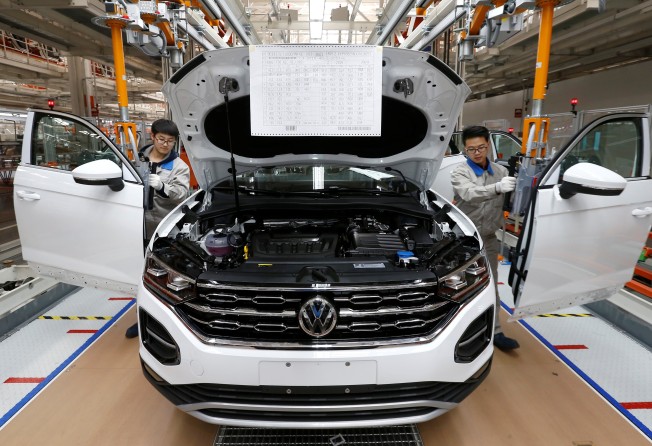
Volkswagen latest to reduce prices in China ahead of VAT cut with sales at record low amid slowdown
- Volkswagen AG’s joint venture with China’s FAW Group to lower guide prices for all models under the Volkswagen brand having already cut prices for all its Audi models
- Chinese Premier Li Keqiang announced earlier this month that the value-added tax rate for manufacturers would be cut from 16 per cent to 13 per cent on April 1

Volkswagen became the latest car brand to cut price in China in a response to next week’s value-added tax cut, but analysts said it would have only limited impact on weakening sales in world’s largest vehicle market.
The sales of passenger vehicles dropped 19.0 per cent in February following the first shrink in nearly three decades in 2018, according to data from China Passenger Car Association (CPCA).
Beijing rolled out policy measures in January to boost consumer spending on vehicles as one of two key tasks to stimulate consumption this year, with hopes of building up a “strong home market” to bolster growth amid the slowing economy.
Volkswagen AG’s joint venture with China’s FAW Group said late on Tuesday that it would lower official guide prices for all models under the Volkswagen brand having cut prices for all its Audi models in China last week.

The company said both price cuts were in responses to a 3 percentage point reduction of the value-added tax (VAT) rate for vehicle manufacturing, with the goal that consumers can enjoy “real gains”.
Huang Xuliang and Dai Shiyuan, analysts from the Zhongtai Securities, recently said that China’s car sales will still shoulder pressure in the near term, despite the stimulate measures and price cuts.
“The car market has been saturated, the potential growth rate has already slowed down, and also faced the synchronised impact from economic downturn,” they said.
Lu Ting, chief China economist at Nomura International in Hong Kong, also said earlier that policies to boost car sales might have limited impact.
“Purchase of cars, which are durables, was stimulated as recently as three years ago,” he said. “High sales volume in the past is now a negative for new sales.”
The car market has been saturated, the potential growth rate has already slowed down, and also faced the synchronised impact from economic downturn.
Chinese Premier Li Keqiang announced earlier this month during the National People's Congress in Beijing the VAT rate for manufacturers would be cut from 16 per cent to 13 per cent on April 1.
Many luxury brands, including Mercedes-Benz, BMW, Land Rover, Jaguar, Volvo, and Lincoln, had already reduced their prices in China before the announcement from FAW-Volkswagen, whose sales in February were the second largest in China.
“[The price cuts] are helpful to ease the wait-and-see mood of Chinese consumers and stabilise the car sales trend,” analysts from the CPCA said.
But the analysts said Chinese consumer should not expect to pay much less for their cars, warning consumers to be cautious with their expectations.
“The cut of final retail price in the future might not be as much as 3 percentage points, due to the features of VAT and deteriorating market competition, but some models’ prices might even rise after the country adjusts it fuel emission standards,” the CPCA analysts added.
Among 89 models that recently lowered prices, more than a half made reductions of less than 2.59 per cent, according to statistics reported by government-backed business news website Jiemian.
Carmakers in China also introduced a round of price cuts last year after the central government cut the VAT rate by 1 percentage point in May, but that did not stop the country posting its first vehicle sales fall since 1992.
Car sales in China dropped 5.8 per cent to 22.35 million units in 2018, according to data from the CPCA, with manufacturers seeing their profits slump by 42 per cent in the first two months of 2019 from the same period last year, dragging the overall industrial profit to its lowest level since 2011.
Some domestic carmakers are also faced with the pressure of rising costs after the government announced it would scale back subsidies for new energy cars by up to 60 per cent.
Chen Hong, chairman of the Chinese manufacturer SAIC Motor Corporation, warned during the National People’s Congress earlier this month that the sales of new energy cars in China might fall by about 40 per cent when all purchase subsidies are cancelled next year.